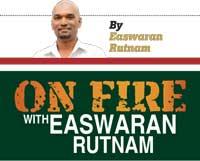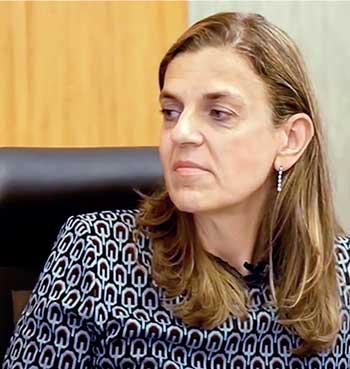04 Jan 2022 - {{hitsCtrl.values.hits}}
 Ms. Mateja Vodeb Ghosh has just taken office as the Ambassador of the Republic of Slovenia for Sri Lanka based in New Delhi. Daily Mirror spoke to the Ambassador just after she presented her credentials
Ms. Mateja Vodeb Ghosh has just taken office as the Ambassador of the Republic of Slovenia for Sri Lanka based in New Delhi. Daily Mirror spoke to the Ambassador just after she presented her credentials
in Colombo.
Excerpts of the interview:
QAmbassador, with the EU completing its term as President of the EU this month, I would like to look back at that role and ask you what were the significant achievements of Slovenia as EU President, in your opinion?
 Oh, I would say that we did, of course, the roles after the Lisbon Treaty, the roles of the member states changed a little bit. We don’t have such a prominent role as before. EU institutions in Brussels, especially the European Parliament, play a much bigger role. But I think we did make an impact. We followed four priorities. The first one, of course, was resilience and digitalization. This was mostly in response to the current pandemic. As you know, the European Union for the first time adopted a very big budget recovery plan. Over 700 billion billion euros. So it was our task to contribute to the national plan to utilise these funds or adopt it as soon as possible in order to go on the road of recovery. And we were quite successful with that. I think around 22 national plans were already confirmed and they already started its implementation. Then, of course, we also were working in the health sector. We strengthened the health sector, so it is more responsive to the current crisis. We also achieved some results in cybersecurity and the Digital Service Act and the Digital Market Act. This was something which the French presidency will still have to carry over. And of course, we were also very active in the climate change area. After the COP26 we were coordinating the EU positions there. And as you know, the European Union also started discussing the very ambitious ‘Fit for 55 package’ which will address climate change and should make the European Union carbon neutral by about 2050.
Oh, I would say that we did, of course, the roles after the Lisbon Treaty, the roles of the member states changed a little bit. We don’t have such a prominent role as before. EU institutions in Brussels, especially the European Parliament, play a much bigger role. But I think we did make an impact. We followed four priorities. The first one, of course, was resilience and digitalization. This was mostly in response to the current pandemic. As you know, the European Union for the first time adopted a very big budget recovery plan. Over 700 billion billion euros. So it was our task to contribute to the national plan to utilise these funds or adopt it as soon as possible in order to go on the road of recovery. And we were quite successful with that. I think around 22 national plans were already confirmed and they already started its implementation. Then, of course, we also were working in the health sector. We strengthened the health sector, so it is more responsive to the current crisis. We also achieved some results in cybersecurity and the Digital Service Act and the Digital Market Act. This was something which the French presidency will still have to carry over. And of course, we were also very active in the climate change area. After the COP26 we were coordinating the EU positions there. And as you know, the European Union also started discussing the very ambitious ‘Fit for 55 package’ which will address climate change and should make the European Union carbon neutral by about 2050.
We managed to stay united, for example, in negotiations with Brexit. But of course, we still have work to do. But I have big faith and hope that we will continue to improve
The other thing which we were very active on and it was our second priority was the future of Europe. A big consultation all over European member states was launched regarding the future of Europe. We organised many discussions in this field, at home and in some other countries. The big event in Slovenia was Bled Strategic Forum. We just want to gather as diverse views as possible from different age groups, different social groups in order to see which direction should the European Union go.
Then, of course, we also worked on strengthening the European values and rule of law, and the first priority was to make the European Union credible and secure and contributing to the security in its neighbourhood, but also, of course, wider in the world. And in that respect, as you know, in August, there was a big Afghanistan crisis. So there were many meetings between defense ministers, interior ministers, foreign ministers organised in Slovenia. And I think discussions were fruitful and they did accept common conclusions, which of course, was a success. Then another crisis we were dealing with, of course, was the crisis in Belarus with the migrants on the border. But I would say the most important event for Slovenia was the Western Balkans Summit in the beginning of October. As you know, Slovenia is a big proponent of expanding the European Union membership with the Balkan states. We know that this will be a long process. It won’t be as quick as we would like to be, but the progress was made, the decision was taken that these kind of meetings should now happen on a yearly basis. And another perhaps success, which I would point out was that water is a big priority in Slovenian foreign policy. Slovenia did succeed to adopt council conclusions on water, which means that the water issue has become part of the work of European Union institutions.
QThere is this criticism that the EU has at times been weak on some sensitive issues, that it could have taken more firm decisions, that it lacks teeth. Do you agree?
Of course, the EU is a composition of 27 member states, plus the European institutions. So it’s not always easy to reach a common conclusion. But I do think we have made quite a big progress in this field. We may still disagree sometimes about certain issues, but like Afghanistan, we were very united. Belarus. I think there is also unity. I think also in other aspects the positions are becoming closer, especially in this changing geopolitical influences. So, you know, we managed to stay united, for example, in negotiations with Brexit. But of course, we still have work to do. But I have big faith and hope that we will continue to improve.
Until 2021 we have had quite a balanced trade volume between us. There wasn't a big difference, a big deficit or I think Sri Lanka was even on the positive side
 QApart from its role in the EU, Slovenia is also now pushing for a non-permanent seat on the United Nations Security Council in 2024-2025. The US had very recently backed Slovenia’s bid. How important is the seat for Slovenia?
QApart from its role in the EU, Slovenia is also now pushing for a non-permanent seat on the United Nations Security Council in 2024-2025. The US had very recently backed Slovenia’s bid. How important is the seat for Slovenia?
I think it’s very important, to be very honest. I mean, I think this kind of membership is even more important for smaller countries, and Slovenia is a big defender of effective multilateralism. So this will be our main goal, you know, to promote multilateralism, inclusiveness and in that respect, we also believe that there should be certain reforms undertaken in order to make multilateralism more effective.
QApart from Sri Lanka, you are also the Ambassador of Slovenia in India. India is the biggest player in South Asia and has a very significant role to play in Asia and on global issues as well. How do you see India’s role particularly in this region?
I think the importance of India has definitely increased in the context of the European Union. And I also see in our foreign policy, I think there are two reasons for that. One is, of course, that in this changing geopolitical structure, we see India as very central to establish multipolar world. We believe the multipolar world will ensure a safer world. Bipolar, we saw in the past that it was very antagonistic, we don’t want that. So in that regard, I think India has an important role to play. And the second thing I would say is that also India has become more active on a global level. They have engaged in many different areas. I think they are quite vocal on climate change. Also the fight against terrorism. So they are doing their efforts on their side, too. But also from our point of view, India is an important player to kind of establish a multipolar world.
I think that this approach about environmental, labour, human rights entering trade negotiations, this is present in all the negotiations the European Union does
QSince you mentioned the importance of India’s relationship with Slovenia, do you see both countries working together on global or regional issues?
The past September, the External Affairs Minister of India was on a working visit to Slovenia. It was in a dual role as bilateral visit and also as a participant in a strategic forum and the informal foreign ministers meeting. And the big discussion there was about the Indo-Pacific. As you know, the European Union adopted an Indo-Pacific Strategy for Cooperation. We were discussing this issue with India before the adoption. So. I would say that, yes, bilaterally we do cooperate. We intensify it with our contacts. There is also such an increase of the Slovenian company interest to enter the Indian market, especially with niche technologies. But we also cooperate with India strongly. Of course, within European Union context. And I would say within the European Union context, cooperation with India has substantially intensified.
QYou know there has always been this criticism that the West is trying to dictate terms to smaller countries like Sri Lanka by using trade ties as a tool. The EU has faced that criticism as well. How do you see that concern?
I can understand that this could be the impression from your side, but I don’t really think this happens only in the case of smaller countries. I think that this approach about environmental, labour, human rights entering trade negotiations, this is present in all the negotiations the European Union does. This is present with Canada. This was present with Japan and Mercosur. So I do think that they in that regard treat countries equally. But I do understand that since the countries are different level of development, that’s for some countries maybe a little bit more difficult to accept the quite high standards, I would say, than for other countries. But of course, certain inflexibility would also be required on the side of the European Union, and I think so far it has showed. But it’s never easy, that I know.
I must say that Sri Lanka is very popular among Slovenian citizens. We are only two million, so our numbers may not be big in comparison to other countries. But Slovenian citizens love coming to Sri Lanka, and they like it
QHow do you see the trade relations between Slovenia and Sri Lanka?
I just checked the numbers before I came here. So until 2021 we have had quite a balanced trade volume between us. There wasn’t a big difference, a big deficit or I think Sri Lanka was even on the positive side. But in the past nine months, our fiscal year starts on 1st of January until the end of December, I have the figures for the past nine months until the end of September, and there was increased trade by about six percent. But to the big advantage of Sri Lanka, I would say you increased your exports to Slovenia by about 50 percent and ours was about 45 percent. So I guess this also reflects a little bit on Sri Lanka’s difficult economic and financial situation at the moment. And I’m sure this will improve. But trade relations are a modest, I would say generally around seven million euros per year.
QWhat improvements will you be proposing during your tenure? What will be your focus area?
I will try build on an already established good political relations. Your current Foreign Minister visited Slovenia already a few times for bilateral talks, and also as the representative at a strategic forum. We want to start with the political consultations between foreign ministries. But in the field of economy and trade, I think there would be focus on tourism which offers quite a big potential of cooperation. I must say that Sri Lanka is very popular among Slovenian citizens. We are only two million, so our numbers may not be big in comparison to other countries. But Slovenian citizens love coming to Sri Lanka, and they like it. The other fields, which we kind of identified recently in my talks with the Foreign Ministry was artificial intelligence, where Slovenia is quite strong, also in robotics, in water management and in general, I would say that where Slovenia excels are the high and niche technologies, so we would definitely focus in that area.
QSo, Sri Lanka has shown interest in artificial intelligence?
That was my impression at the recent talks. It was actually the Sri Lankan side who raised this issue. In that respect, in Slovenia, there is an International Research Center for Artificial Intelligence. And the main task of this centre is to implement the Sustainable Development Goals with the help and assistance of artificial intelligence. So I do think we could find quite a few opportunities to cooperate in this area.
QHow do you see China’s strong presence in this region? Is that a threat as some call it, for regional security?
I would say that the attitude toward China has changed a little bit. And from the point of the European Union, we see it as a strategic rival in certain areas. But we also see it as an indispensable partner in certain other issues like climate change. I think we all know that without China, even without India, the climate change goals we want will not be achievable. But yeah, in general, I think the approach has changed a little bit. But at the time being, I wouldn’t say that we see it as a threat, but as a strategic rival in certain areas and as an indispensable partner in climate change and some other issues.

29 Apr 2024 1 hours ago
29 Apr 2024 2 hours ago
29 Apr 2024 2 hours ago
29 Apr 2024 3 hours ago
29 Apr 2024 4 hours ago